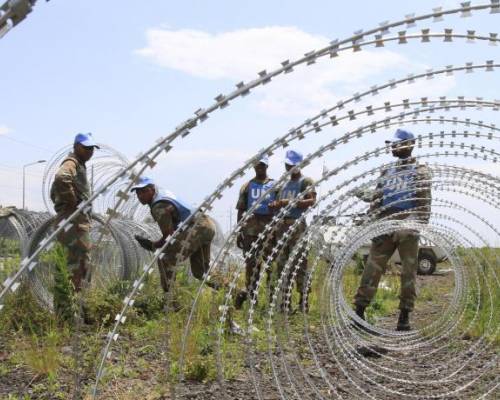Beyond Crisis in the DRC: The Dilemmas of International Engagement and Sustainable Change
Chatham House has published a paper by Ben Shepard, which RPS found interesting and would like to share with you. The paper is below:
This research paper looks at the policy challenges and opportunities for change and sustainable progress in the Democratic Republic of Congo (DRC).
The Democratic Republic of the Congo (DRC), still emerging from decades of war and generations of pervasive misrule, may be in a position to break loose from a seemingly eternal repetition of violence and mismanagement, and move towards both a democratic transition of power and genuine postconflict stabilization.
Despite the significant obstacles to progress that remain, a confluence of circumstances and actors has opened the way for change. President Joseph Kabila’s second term in office, the maximum allowed under the constitution, comes to an end in 2016. The DRC’s neighbours, regional and international partners are engaged and relatively coordinated.
The threat to the Congolese government from rebels is much reduced since the defeat of the M23 in late 2013. And politics in the capital, Kinshasa, is in flux – a ‘government of national unity’, expected since late 2013, was finally appointed in early December 2014, but key questions around forthcoming elections and Kabila’s third-term intentions remain unanswered.
This convergence of circumstances has generated three interlinked policy challenges relating to elections and alternative political voices, post-conflict challenges and international consensus. These must be addressed if the DRC is to move beyond the impasse of recurring crisis.
There are rumours of plans to revise the constitution to allow for a third term for President Kabila, or that elections may be postponed. International engagement in supporting robust, well-run and timely elections is essential if there is to be sufficient confidence in the possibility of change for alternative voices in Congolese politics to emerge as a force for political progress.
While the country’s conflict-affected east may be calmer than has been typical over the last decade, a complex tangle of post-conflict challenges remains, with significant numbers of armed men still present, most importantly the Forces Democratiques pour la Libération du Rwanda (FDLR), and violence is reported from Province Orientale in the north to Katanga in the south. Demobilization, reintegration of former fighters and meaningful military reform remain enormous challenges.
Significant energy will be necessary to generate and maintain international consensus on these fundamental questions. The re-engagement of SADC states in the DRC played a critical role in opening the way for potential progress, a reality that must be understood and reflected by the traditional donor community. Sustained donor engagement in key capitals – notably Pretoria and Luanda – is essential.
But to sustain the unity and momentum necessary to address these policy challenges, the international community must resolve the dilemmas they bring. International partners will have to balance the need for political progress with the imperative of maintaining stability. It will need to reconcile the challenge of remaining armed groups with the need to reform the Congolese military and consolidate peace in the east. And it will need to maintain the fraught relationship between the DRC and its eastern neighbours.
Progress requires tough choices. The pursuit of sustainable positive change in the DRC requires clear, open and honest dialogue, both among the DRC’s external partners and between the international community and Congolese interlocutors. Though the obstacles to progress are real, and daunting, they are not insurmountable.
Photo by JAMES AKENA / Reuters / Corbis.


